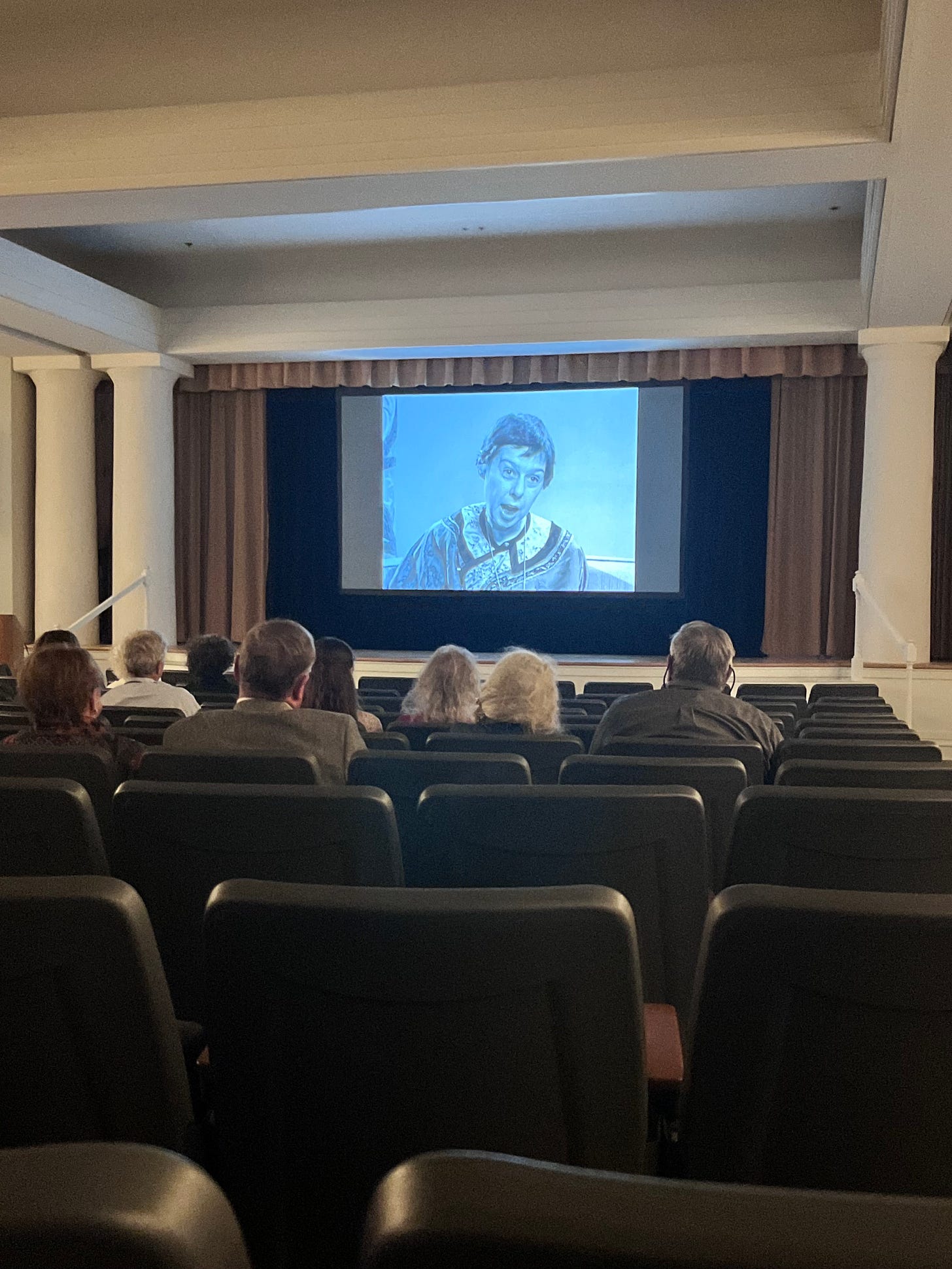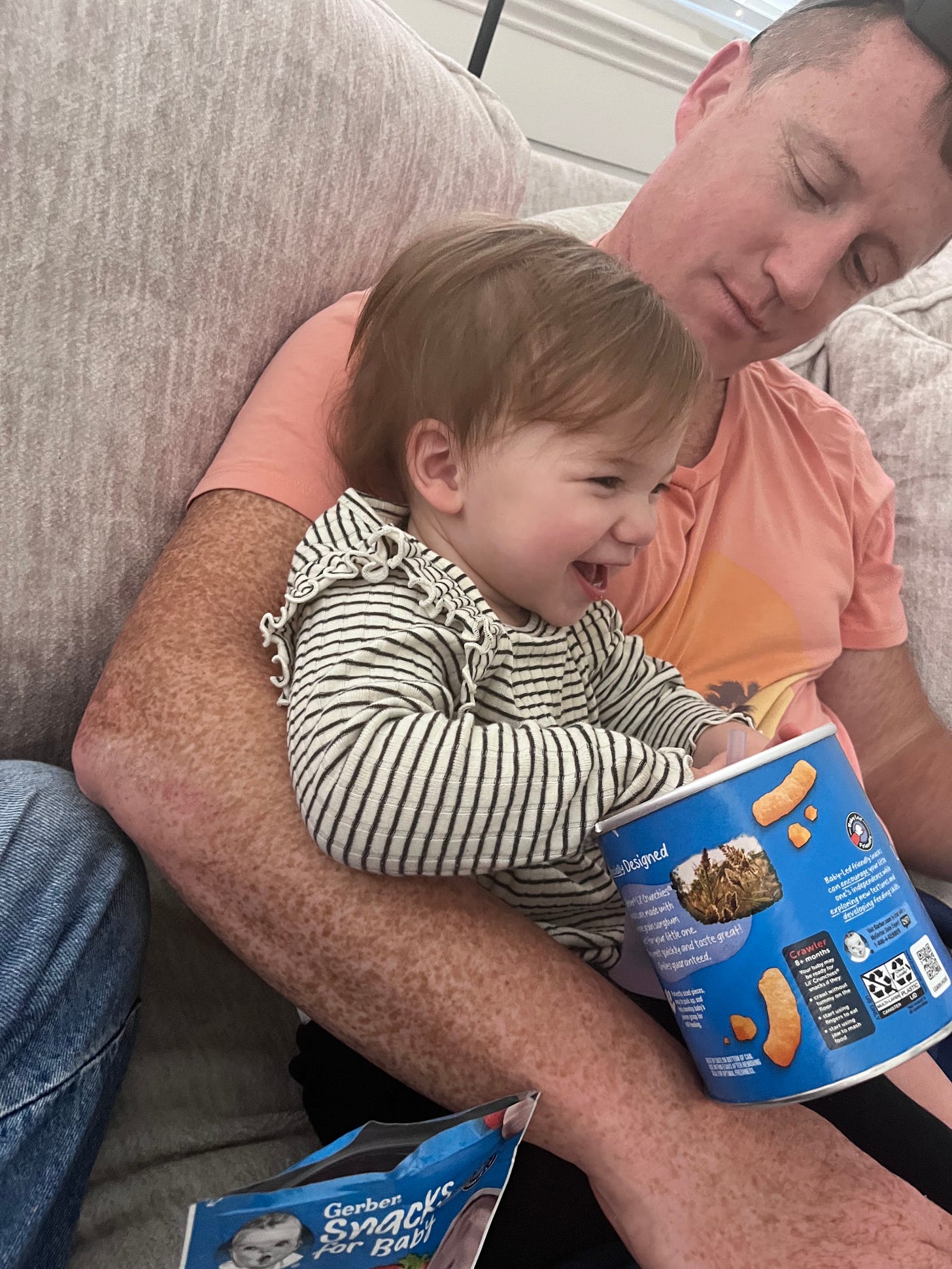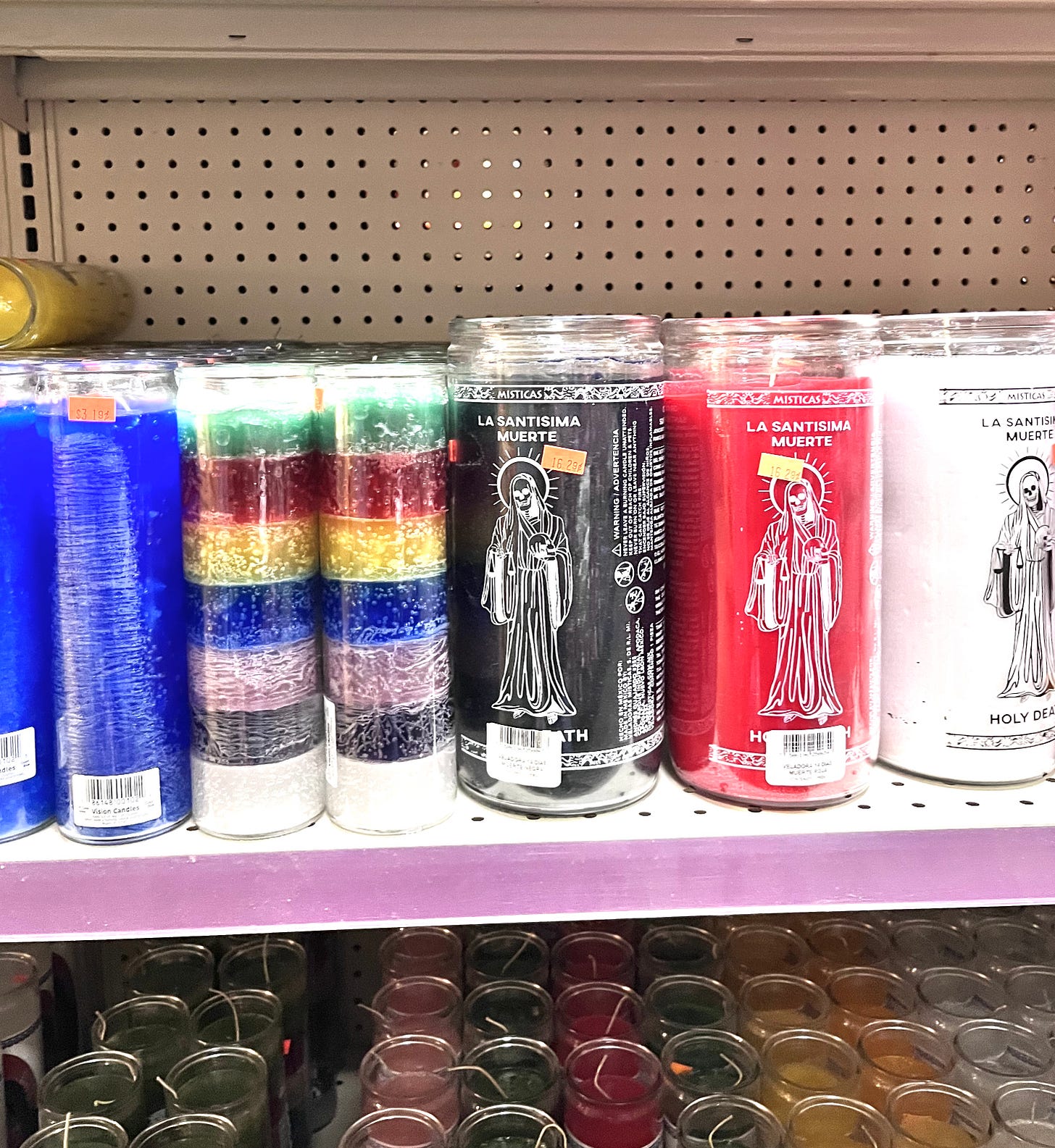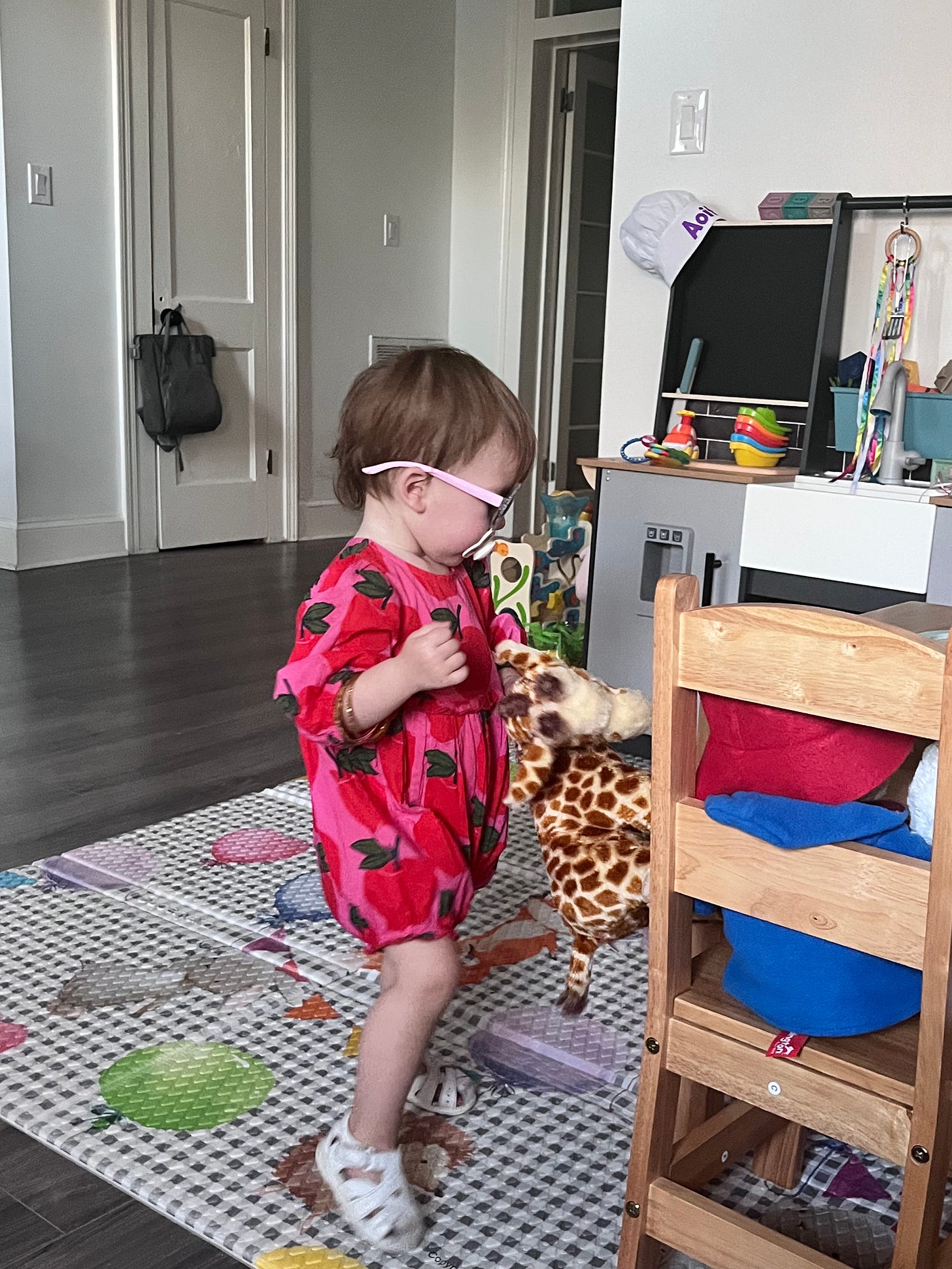Something entirely free
A word on the state of affairs, eggs, Big Industry, the Norovirus, and hypocrisy--including my own.
This morning, I played Chappell Roan’s Grammy performance for my daughter—Aoife, who lay next in bed to me in her Elton John sunnies, two headbands, and gold bangles, a gift from my friend A—from my friend A’s trip home to India. Every day, Aoife runs to my bedside table—first, to shake my pill bottles. Then, to collect her gold.
While Aoife watched Chappell, the “Midwest Princess” and a champion of queerness in a time when LGBTQIA+ rights are under attack, ride her big pink pony with her blue eye shadow and lush red-wine hair, I teared up. At the lyrics, “And I heard that there's a special place/Where boys and girls can all be queens every single day,” I could only think: I want this for my child. I want my child to be able to one day access that special place. Be it real. Or, figurative.
Then, for my baby, I played it again.
*
In Motherhood, Sheila Heti uses a coin-flipping method (heads for yes, tails for no) as a way to propel her book’s narrative. Struggling with the decision of whether or not to have a child, of whether or not to become a mother, she flips the coin and asks a range of questions—from the generic (Should I have a child? Will having a child ruin my life?) to the specific and seemingly unrelated (Jacob names his wrestling place Penial. Is he naming a personal taboo, in doing this?). While Heti reacts to the responses and revises her questioning in accordance to the coin’s answer—begging the reader to ask if it is the coin divining answers or if Heti, herself, is guiding the response, she also expresses a desire to open herself up to randomness, arbitrariness. Chance.
Last Friday, at a grocery store here in Columbus, we came to the refrigerated aisle, where we saw racks emptied of eggs, and under the racks cardboard boxes filled with eggs that had been broken. Their white casings smashed, their yellow innards oozing. Two women stood next to the fridge, upset by the scene. They commented on the invisible egg handlers. How could they break the eggs, they said. How could people be so careless. And, then the egg shortage more generally: How are all the birds so sick. How come this is happening. How random. How freak. What luck.
These weren’t the first women I’d seen standing over the eggs in a refrigerated aisle in Georgia in recent weeks.
And this isn’t the first time I’ve seen women standing together—and sad.
*
In American stores randomness is excised.
There is an illusion of choice.
Pick Tide or Gain, Neutrogena or Aveeno, Oreo or Chips Ahoy! The differences—the this or that— are truly arbitrary, our money flowing back—regardless of our choice—to the same few conglomerates: Proctor & Gamble, Mondelez International, Johnson & Johnson.
Our purchasing in the U.S. similar in its meticulous orchestration.
Companies don’t just sell cherry tomatoes or shaving cream, but the intangible. They sell status, simplicity, community—emotionally tying us to things. The Stanley Cup. Cape Cod chips. Tillamook cheese. These products, through marketing, become more than commodities. They grow into our emotional security, our sense of betterment—our blankets. Static in packaging, reliable in taste, feel, smell, they deliver “comfort” in a world we know to be weak, tremulous— a world disintegrating before us, around us, everywhere we look.
*
Last week, before Aoife’s 15-month check-up and vaccinations, I snuck away from my house, work to get a poke bowl at Columbus’ Food Hall. The man behind the counter plopped hunks of deep red tuna, chilled rice, curled scallions, seaweed salad, thinly sliced cucumbers, and fried onions in a bowl. As I walked down the assembly line, a thing made for mass production, I learned they were out of edamame—well, at least the pre-peeled kind. Hesitantly, I opted for the beans’ hairy, whole substitute, then I sat in the corner of the hall—squishing each little pod’s belly, popping the pods’ beans into my bowl. I mixed them in only to search for and then fork them out. I paid $15 for this singular action—that is, I didn’t pay for the tuna or the rice or the scallions or the seaweed salad or the cucumbers or the fried onions, but, instead, the finding. Each meaty, rich little green bean a kind of delicacy.
Later, when we took Aoife into the doctor's, I caved and purchased a decaf iced Americano at Starbucks: a different kind of delicacy.
When I ordered, I was told by the barista that they had all the seasonal flavors still: Chestnut Praline, Caramel brûlée, Cran-merry. For $1.65 extra I got the special sugar cookie “foam”—foam, which is no more than cream and air, from a company that has abolished its DEI programs, a company with supply chain ethics problems—particularly with regard coffee bean sourcing, a company whose very presence destroys small businesses. And yet, in that moment at the counter, all I could think was: I deserve this. Despite what is unfolding—or because of what is unfolding, I am deserving of something special.
America conditioning me to believe this as truth.
*
On Sunday I went to see a documentary on Carson McCullers—Wunderkind—at The Columbus Museum. It has been a film I bookmarked several weeks ago on the Museum’s site, saw as the singular “cultural” event in a city devoid of culture, or one that receives culture’s leftovers—traveling ballet companies from outside the country, retired plays, little-known bands.
The first half of the film showcased the Historic District of Columbus, where we live, but where McCullers never did. There was a shot of the old grocery—the Coca Cola sign out front, weeds creeping up its brown edifice. There was a shot of the house where Bella, the neighborhood basset hound, lives with her owners—the owners whom we cross frequently and whose names we never ask of, ask for, but who let Aoife pet their dog, her silken ears. There was a shot of potted plants swinging from the ceiling of one of our neighbor’s porches, then a shot of another familiar porch. Then, a familiar fence. A second lie, then a third. A fourth.
Near the documentary’s end, we learned details about the famed summer McCullers went to Nantucket to write with Tennessee Williams at his rental at 31 Pine, a house bedecked with those quintessential, faded New England Cape Cod shingles and where hydrangeas—their great purply blue—filled the fireplace. The documentary mentioned the two great writers would sit smoking and typing across from each other at a long wooden table. Something about that long wooden table, the writing, the smoking felt freeing in a way I can’t express. The documentary also revealed that McCullers took to cooking for the two writers while holed up in that house on the island: an oeuvre made up mostly of pea soup with bits of hot dog chopped up into it. I imagine the pea soup coming from a can, the salty hot dogs from a small plastic package.
The food and the food’s familiarity warming in a way that is difficult express, too. Exquisite in its oddity and also oddly American. Something somewhere I could believe as true.
*
In the face of Trumps’s tariffs, TikTok reels reveal lists of cans and dry goods to keep in the house, as well as meat to pack and freeze. Other reels encourage women to gut their homes to create cellars, learn how to can. One reel shows a woman filling mason jars of water—her voiceover noting that both the glass and the glass of water take up equal space. More alarmist reels paint an apocalyptic future, one of a failed power grid. They ask users to imagine no electricity, no heat, no working fridge, no internet. To imagine no ability to use credit cards, no ability to buy food, no way to fill up gas tanks. To imagine the breakdown in communications between companies and container ships, container ships and delivery trucks, delivery trucks and local grocery stores.
I realize, however, as I watch these reels, I don’t even have to imagine.
During our first summer in Key West, we experienced a total power failure the lasted at least three hours. There was no cell service. There was no internet. I walked a mile to the Coast Guard base to contact T, only to learn the calling capabilities from the gatehouse to the ships were no longer. By chance, I saw T’s blue Civic and waved him down. Together, we rode to a local gas station, only to learn the outage was island-wide, and we couldn’t pump gas. Next, we went to a food truck with what little money we had, where we learned a sole grocery store had internet connection, and there, those with iPhone had the unique ability to iMessage “out.”
The source of the connection: a satellite dish.
Elon Musk’s Starlink.
*
While working, a clip of Jon Stewart's latest bit came across my phone, and I couldn’t help but laugh aloud. Stewart first showed a clip of Trump denouncing “terrible” trade agreements in 2025—asking how could “anyone” have agreed to this. The “anyone” turning out to be Trump himself, during his first presidency. Then, Stewart showed a clip of Senator Chuck Schumer of New York, who said the soon-to-be imposed tariffs were going to affect guacamole—guacamole, which he pointed out, comes from avocados—and Corona beer. As he spoke, he held the black husk of an avocado in one hand and a golden-hued bottle in the other.
The examples, the holding—so narrow as to be absurd.
*
I have not had alcohol in two weeks.
At first, I stopped drinking because of a respiratory illness, then because of my impending endoscopy, then because of the highly contagious Norovirus, then because of my endoscopy again.
The result of my endoscopy was less than rosy. An ulcer at the meeting point of stomach and esophagus. Grade Two esophagitis. Chronic stomach inflammation. No evidence of my Nissen Fundoplication. Likely herniation. Barium Swallow ordered.
Roughly ten years ago on a Friday in April and one month before I became ill with gastroparesis, I got sick with the Norovirus. Ten years later, a week after having the Norovirus for a second time: I learn I am herniating into my chest.
The internet will tell you post-viral gastroparesis and can occur in up to 5% of people who have been infected with Norovirus (that 5% likely includes me).
The internet will also tell you the Norovirus is the biggest cause of illness from contaminated foods in the US.
It will further tell you about the current surges in the Norovirus nationwide, as shown by CDC data.
Finally, it will tell you data sets are beginning to disappear from the CDC’s website.
Employees ordered to scrub references to diversity, equity, inclusion (DEI), and gender diversity from federal resources, affecting valuable information on topics such as HIV, STIs, and contraception.
*
The day after her vaccinations, and Aoife pushes her legs out like heavy logs of wood--unmoveable. T and I bookend her and help her flip through her touch-and-play My First Carnival of the Animals book—her pointer finger drawn to the silver membranous button that cues each musical piece: The Royal March of the Lion, The Elephant, The Swan.
She is sore—in pain, and also refuses to eat. After days of Norovirus and many wet diapers, her growing appetite (bananas! strawberries! soy-marinated steak! Classic French Madeleines!) ebbs after her shots. She cries when we move her, her legs—particularly the left hip—and calls only for her "Cheetos.”
The “Cheetos” a product from Gerber, a subsidiary of Nestle, Nestle the third largest producer of baby formula and a company historically engaged in lobbying activities that influence parental leave policies. For better. Or—I assume the more likely—for worse.
*
In preparation of a workshop, I read a poem from Katie Naughton titled “debt ritual: trash,” which I am led to believe will appear her forthcoming chapbook from Bunny Presse—Debt Ritual, a book which interestingly enough is the exact size and shape of the U.S. dollar bill:
if nostalgia is one way to die
then having things is one way to live forever
if the unabated present is a sun that is bearing down on us
a home is a place where objects collect
if minimalism is beautiful it is
because of the cheekbones who can afford to buy things a second time
As I read, I sit, with my own cheekbones basking in the red light of an OmniLux mask. OmniLux acquired by GlobalMed, a telemedicine company that also owns Colorescience, Dermastart, Nutrafol, Skinceuticals.
The following night, when I lie in bed lit like a Christmas tree, Aoife sleeps on her side, her Hatch playing a symphony of waves. Through the slits in my mask, I can see, but only slightly, and so begin to scroll through the only thing I can read: photos. In my stream, I find an image of a lengthy aisle of prayer candles, another of pinatas, star-shaped and with colorful crepe paper. The photos are of Las Americas Super Mercado in Columbus, a Mexican/Latino supermarket where we go twice monthly for steak of the thinnest variety: sabana de res.
It is at Las Americas that we as a family buy novelty items: half-liters of "Mexican Coke,” chocolate-covered gummy bears, and Nutella-filled biscuits. When we get home for these routine trips, I get down to eating the biscuits straight away, and I eat them in one particular fashion. I crush the top half of the cookie into moveable bits then use my bitten nails to unearth the Nutella, licking the Nutella from the cookie’s rounded belly. The circle of hazelnut is perfect every time.
*
Miss Rachel, who teaches my daughter about circles using the roundness of wheels as an example, shares a reel on a platform owned by a company that just paid Trump 25 million dollars. In the reel, two Palestinian children Celine and Sila watch Ms Rachel on Youtube in a tent in Gaza. Miss Rachel can be heard singing a song we, too, sing from a small phone, “Big feelings are okay. It’s okay to have big feelings.” As the song progresses, the littlest child—Celine? Sila?—claps.
On the same platform, I see a different video of two children in Gaza. It is a news story of a father who had bought his two sons, Taim and Ibrahim, a treat. After a year without chocolate, the father pulls from his backpack a rare yet coveted jar of Nutella. The cost of that single jar: $50.
Later I will watch a video of Trump—who is set to meet with Benjamin Netanyahu—speak on Gaza. To a reporter he says: “You know Gaza is interesting, it’s a phenomenal location. It’s on the sea. The best weather…Some beautiful things could be done with it. Some fantastic things can be done with Gaza.”
Two children. On the ground, in a tent.
A father, his sons, one small jar of Nutella.
A phenomenal location.
The best weather, on the sea.
*
In a few months, we have plans to go to the sea—to our home in the Keys, and I have been thinking about life away from big box stores (there are none in Key West) and also the need also to take real action—fully buy-cotting Big Industry.
Aoife will be older when we visit the islands—talking and walking, and there—I anticipate—experiencing more “culture” and more calm: historic society events, art studio classes, walks to the beach and spying roosters, visiting the local Cuban coffee spots that know me by my order: cream and sugar with a hint of coffee, eggs and cheese on Cuban bread.
For the trip, I have ordered Aoife a set of bangles to replace my own—bangles that are small enough so she won’t have to bend her elbow to keep them from falling off. These bangles aren’t delicate and pretty but loud and purposely unapologetic: acrylic with multi-colored hearts, swirled and glittery designs. Punk and whimsy and, in a way, a kind of special place.
As I write this, Aoife sits at her Melissa & Doug table with Pandie, Joseph the Giraffe, and Mr. Sloth—her arm bent, her elbow shimmering in temporary gold. She is filling her babies’ cups with tea, stirring their cups judiciously with tiny wooden spoons. I ask her if they are hungry, and she tilts her head, searches for then picks up her play set’s faux biscuits—wood and square, with red hearts in the middle, putting them close to her babies’ mouths. Yumyumyumyumyum, I spout loudly, machine-gunning their hunger, and she laughs. Yumyumyumyumyum, I growl animal-like again just to hear the sound again.
The table: bought on Amazon, regrettably.
The play set: regrettably bought on Amazon, too.
But the tea of air? The care of inanimate things and the imagination and the play and the growl and the laughing? That beautiful, tinkling laugh?
Something entirely different.
Something entirely free.








